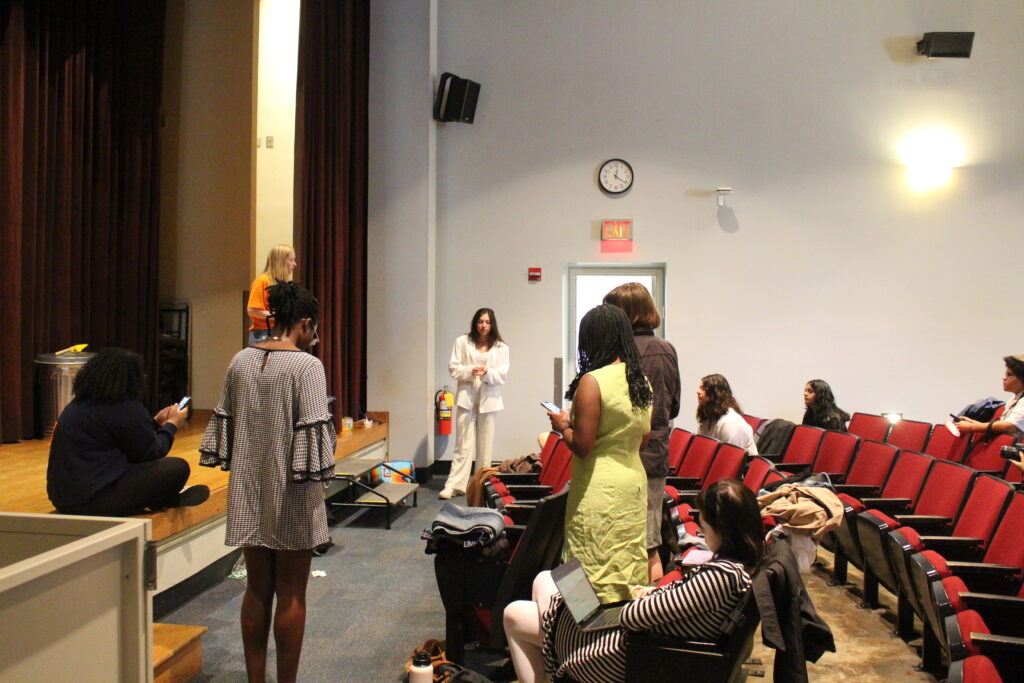 (Courtesy of Matthew Paulin)
(Courtesy of Matthew Paulin)
Valerie Solanas’ satire “Up Your Ass,” which she wrote in 1965, oozes with her characteristic aggression and passion. The play follows Bongi, a lesbian prostitute, as she encounters a variety of characters, including cat-callers and drag queens. Emory University’s production of “Up Your Ass” opens on Nov. 3 in Harland Cinema, and the play will run through Nov 5. Olivia Gilbert (26C) directs the entirely student-led production.
This production is funded by Clifton Communities, an initiative introduced by Residence Life and Housing Operations for the 2023-2024 academic year. With this initiative, sophomores in groups of six to 12 share one or two suites in Clifton Tower and receive funding for an arts project that will occur during the academic year. The production of “Up Your Ass” is the first half of one Clifton Communities’ project, with the second half being a documentary on the rehearsal process, which will be edited and released in 2024.
Gilbert, who is the project lead for the Clifton Communities production, became interested in Solanas’ work in fall 2022 after reading about her in a women’s, gender and sexuality studies (WGSS) course titled “Gender Trouble,” which Samuel Candler Dobbs Professor of WGSS Elizabeth Wilson taught.
“I read the play and thought, ‘Oh, this is crazy. It’s terrible. It’s so fun,’” Gilbert said. “And my friends were also interested in Solanas and her work, so it just evolved.”
Later, she and five other students, including Mya Green (26C) and Sandy Askins (26C), asked Wilson to be the faculty advisor for the Clifton Communities project.
The production began at the start of the semester. Green created and distributed posters influenced by the “SCUM Manifesto” cover and a general late ’60s aesthetic. The project slowly garnered interest through persistent advertising. Finally, the production team held auditions on Sept. 8-9, and everyone who auditioned got a role. Most of the cast does not have prior theater experience, including Gilbert, who has never directed a play.
“[The cast] is all so close because of the meetings we’ve had and just the conversations we’ve had,” Green said. “There’s not a lot of pressure to be this amazing actor. We’re just having fun with it.”
The cast fostered a collaborative atmosphere. While Gilbert is the director, she said others helped her by giving notes on delivery and blocking.
“We’re all contributing in that way,” Gilbert said. “We watch someone perform a scene, and then the entire cast gives feedback and stage direction. It’s really a joint thing.”
Part of this cast-wide collaboration included revising the play’s content. The cast unanimously decided they were uncomfortable delivering lines that included slurs written in the original manuscript and chose to replace them. For example, “fruit” replaced the F-slur.
“We prioritized our actors and how comfortable they were performing it rather than the artistic integrity of the piece,” Gilbert said.
Nonetheless, “Up Your Ass” contains an abundance of shocking, disturbing and what some may consider problematic content.
“It’s satire against every single type of person,” Gilbert said. “You can’t get away from it, and it’s so knowingly transphobic and racist that it almost subverts itself.”
However, the show delivers more than shock value, as Gilbert, Askins and Green alike acknowledged the hilarity of the content. They believe that the offensive material is inextricable from the humor, and they may even complement each other.
The show’s vulgarity allows it to transcend time, and this raunchy comedy brings relevance to modern audiences.
“The people that are represented and those interactions are still relevant to our modern world,” Green said. “There’s a character named Ginger, for instance, and I would describe her as a modern day ‘pick-me’ girl, even though this was the 1960s.”
Indeed, this play has the potential to be divisive. Solanas’ writing is what Wilson describes as “confrontational.” However, the students involved in Emory’s “Up Your Ass” production hope to use the play’s comedy and unsavory material to open a dialogue.
“We want people to really talk about what this was, and what it is now,” Gilbert said. “Whether or not it’s totally gross and should never be performed again, or if maybe it’s a radical act of feminism that we shouldn’t ignore anymore.”Askins hopes that viewers can position the play’s content in relation to their own lived experiences.
“Sometimes, it’s not going to be as explicit as it is in the play — the sexism, the poor treatment,” Askins said. “There’s glimmers of reality in it that could be very easily cross-applicable to everyday life.”
Wilson believes this production could bring awareness to the diversity of feminist thought, an especially pertinent issue on a college campus.
“It’s really important that college students see the wide variety of what gets called feminism,” Wilson said. “Everyone’s not marching to the same beats, and that there are some people related to feminism who really disagree with each other.”
Gilbert hopes that viewers, regardless of whether they react to the play with delight or disgust, will remain open minded to Solanas’ previously unplatformed and dismissed ideas.
“It’s so open to interpretation, and it has not been interpreted because people just think that [Solanas] is insane,” Gilbert said. “By opening it, we’re allowing this brilliant woman to have her voice and be understood.”

Alex Kauffman (they/them) (26C) is majoring in English & Creative Writing and Film & Media Studies. They were born and raised in Phoenix, Arizona. At the Wheel, they have been an Arts & Life campus desk and section editor, and they are currently a senior staff writer. Outside of the Wheel, Alex is a Media and Entertainment Pathways Scholar and a tutor at the Emory Writing Center. In their free time, Alex is an avid movie watcher and iced latte consumer.






